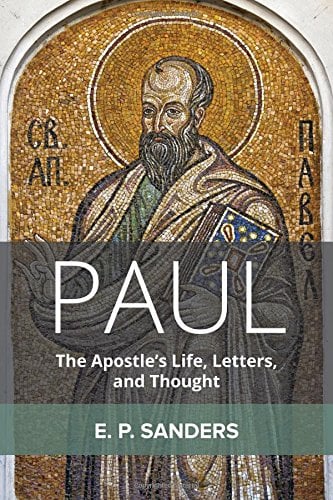Chapter Two: Paul the Apostle to the Gentiles
p. 87— He deduces that Paul was converted in Damascus because Paul says he returned to Damascus in Gal. 1. [This does not follow, but it reflects a pattern of lack of confidence by Sanders in the accounts about Paul in the early chapters of Acts.]
p. 88— Sanders says Lightfoot is my favorite of the older commentators on Paul, but he and Burton work with a romantic assumption that Paul worked out the theology of Romans before he began his missionary journeys, and while he was in Arabia, which Lightfoot took to mean near Mt. Sinai. Sanders view is that Paul had not wrestled with the problem of the Law early on, and it is not reflected in his early letters 1 Thess. 1 Cor. 2 Cor.
p. 89—the monumental “problem seems to have hit him hard and taken him by surprise at the time of his difficulties with the church in Galatia. Thereafter he struggled with it in Galatians, Philippians, Romans.”
“One of the principle arguments of this book is that Paul did not work out a full theological system, and he certainly did not do so in advance of his career as apostle. The existence of such a system is called into doubt by his correspondence where he seems to be making a lot of ad hoc ‘on the spot’ decisions. In 1 Thessalonians for example we see that he had not prepared his converts to anticipate their own death and resurrection, but rather had instructed them to wait for the return of the Lord.” [N.B. we do not know he did not tell them about these things. What we know is that some Thessalonians had not understood the implications of his teaching about resurrection and return]. Sanders thinks he wrote Galatians and Romans near the end of his ministry (placing Galatians late).
pp.90-91– Sanders views is that Paul went to Nabatean Arabia which included various Decapolis cities south of Damascus where Paul could support himself. The journey to Mt. Sinai would have taken 40 days through desert and would have required a considerable support staff, camels, donkeys, guides etc. and Paul didn’t have the wealth for all that, in Sanders view. Sanders allows that Paul probably did during his time in Arabia reflect on what was next, and what his message would be, but he did not come out of Arabia with a full systematic theology, and apparently he had not fully figured out yet about the Law and the Gentiles relation to it.
[N.B. Sanders works with a developmental model of Paul’s thought, and how one arranges the letters affects how one views the matter. Because Sanders puts Galatians later in Paul’s ministry, this allows him to think that Paul didn’t deal with the Law issue until later. This view self-destructions if Galatians is a very early letter written after the first missionary journey. Note that Sanders defends the north Galatia hypothesis found in the older commentaries of Lightfoot and Burton]. Sanders proposes that Paul reflected on Scriptures dealing with converting of Gentiles while in Arabia. None of this explains why Aretas was after him in Damascus.
pp. 92-93 he stayed in Arabia parts of 3 years, perhaps A.D. 33-35.













